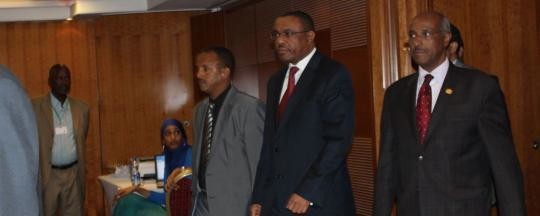East African nations on Monday laid out the form for South Sudan’s next round of peace talks, stating that the regional Intergovernmental Authority on Development (IGAD) will mediate with or without all parties present, that those who delay will be excluded from future governments, and that non-armed stakeholders must be included in negotiations.
This stance comes after increasing high-level involvement by Ethiopian and Ugandan leaders in particular, after previous rounds of the peace talks stalled despite grave warnings from humanitarian organizations.
Uganda and Ethiopia are both members of IGAD, the regional bloc trying to bring together the two warring sides of the ruling Sudan People’s Liberation Movement (SPLM), the SPLM-Juba forces loyal to Salva Kiir and the SPLM-In Opposition forces loyal to Riek Machar.
The two sides have been locked in a bloody stalemate for months.
Both Uganda and Ethiopia also have military forces present in South Sudan, the latter as part of the UN peacekeeping mission and the former as allies of the SPLM-Juba faction of Salva Kiir.
Ugandan leader Yoweri Museveni has been seeking an exit strategy and last week welcomed a delegation of SPLM-IO to Kampala to discuss the peace process, before heading to the IGAD summit on Sunday. He also met with the SPLM-Juba faction leader, whose negotiators last week continued a boycott of the peace talks, the latest in a string of obstacles to the process thrown up by both sides over the past eight months of war.
In yesterday’s communique, IGAD leaders said that IGAD will henceforth carry on with mediation regardless of whether one side is not at the peace table, saying that it “directs the mediation [to] continue in spite of any stakeholder boycotting the negotiations.”
Strongest threat yet
IGAD also expressed the strongest threat yet against South Sudan’s warring parties: anyone who obstructs peace in the country will be excluded from future governments.
That warning comes on top of existing threats of targeted sanctions against the belligerents.
The bloc also “[assured] the people of South Sudan that such individuals or actors will be held responsible for their actions,” though did not mention that those who committed gross violations of human rights will be held accountable for atrocities, as other communiques have vowed.
IGAD further staked out its position on the inclusion of non-armed stakeholders’ participation in the peace talks, rejecting complaints by the two armed SPLM factions over the participation of civil society, religious groups, non-armed political parties, and the former detainees group.
“The political and humanitarian crisis in South Sudan cannot be solved by the two warring Parties alone,” IGAD said, adding that the negotiations require all other stakeholders present throughout the process.
45 day deadline
IGAD announced that the two warring parties agreed to negotiate details of how to implement the 23 January cessation of hostilities within six weeks.
This agreement is the fourth such commitment to implement the ceasefire and open up humanitarian access to affected civiilans. There has been little actual progress on the ground.
IGAD also gave the stakeholders 45 more days to form the transitional government of national unity, which was supposed to be formed after a 60-day period that expired 10 August without progress made.
Related: Document: IGAD Heads of State communique on South Sudan
File photo: IGAD Chairman and Ethiopian Prime Minister Hailemariam Desalegn (left) with IGAD Special Envoy and former Ethiopian Foreign Minister Seyoum Mesfin, February 2014
For breaking news updates from Radio Tamazuj ‘like’ our page on Facebook, follow us on Twitter, or subscribe to our RSS feed.




